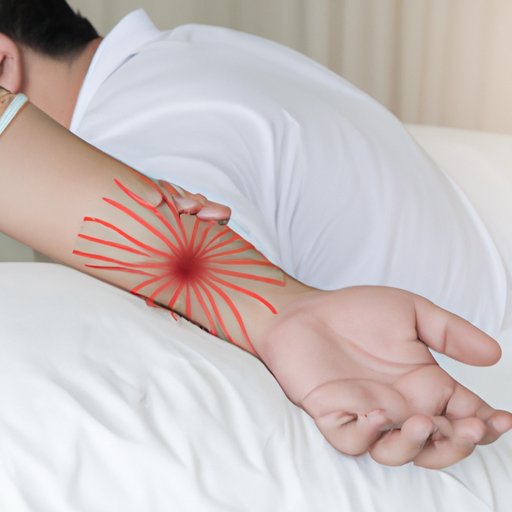
I. Introduction
A pinched nerve is a painful and disruptive condition that occurs when a nerve is compressed or damaged by its surrounding tissue or bones. The condition can cause a range of symptoms such as numbness, tingling, weakness, and pain. The purpose of this article is to inform the audience about the causes, symptoms, prevention, diagnosis, and treatment options for a pinched nerve, as well as some home remedies and coping strategies.
II. Causes of a Pinched Nerve
A pinched nerve can have several causes that include physical injury, repetitive motions, arthritis, poor posture, herniated or bulging discs, tumors or cysts, and even pregnancy.
III. Understanding Nerve Compression
Nerve compression occurs when pressure is exerted on a nerve by its surrounding tissues or bones, leading to reduced blood flow and impaired nerve signaling. The results can be numbing, tingling, weakness or pain.
IV. Common Symptoms of a Pinched Nerve
The symptoms of a pinched nerve may vary depending on the location of the affected nerve. Common symptoms may include numbness and tingling sensations, muscle weakness or coordination loss, sharp, burning, or throbbing pain, and sensitivity to touch or temperature changes.
V. Prevention Techniques for Pinched Nerves
There are several ways to prevent a pinched nerve, such as maintaining good posture, taking breaks during repetitive activities, doing stretching and strengthening exercises, avoiding heavy lifting or awkward positions, wearing supportive shoes and using proper equipment.
VI. Diagnosis and Treatment Options
Doctors may use physical exams or imaging tests to diagnose a pinched nerve. Range of treatment options available such as physical therapy, chiropractic care, acupuncture, medication, and surgery may be necessary depending on the severity of the nerve compression, with each treatment option having its risks and benefits.
VII. Home Remedies for Pinched Nerves
Home remedies for pinched nerves include heat or cold therapy, taking anti-inflammatory medication, gentle exercises or stretches to relieve tension, using splints or braces to support affected limbs or joints, and avoiding activities or positions that aggravate the symptoms.
VIII. Coping With a Pinched Nerve
People can cope with a pinched nerve by making lifestyle adjustments such as modifying work or leisure activities and getting enough rest. Pain and discomfort can be managed by following a healthy diet, workout routines, and practicing relaxation techniques. It is essential to stay active through low-impact exercises or physical therapy and seeking support from healthcare providers, family, and friends.
IX. Conclusion
A pinched nerve can be a painful and disruptive condition that requires immediate attention and proper treatment. However, by engaging in preventative measures, seeking medical help, and following the recommended treatment options, individuals can recover and return to a pain-free, active lifestyle.





